Overthinking It is celebrating our nation by searching for the most American piece of pop culture with the word “American” in the title. Read the entire series here.
 t the end of the second round, we narrowed the tournament down to just two competitors per category. Now it’s time to figure out what piece of pop culture (with “American” in the title) best epitomizes Violence and Sex. Here’s how things stand. Click to embiggen!
t the end of the second round, we narrowed the tournament down to just two competitors per category. Now it’s time to figure out what piece of pop culture (with “American” in the title) best epitomizes Violence and Sex. Here’s how things stand. Click to embiggen!
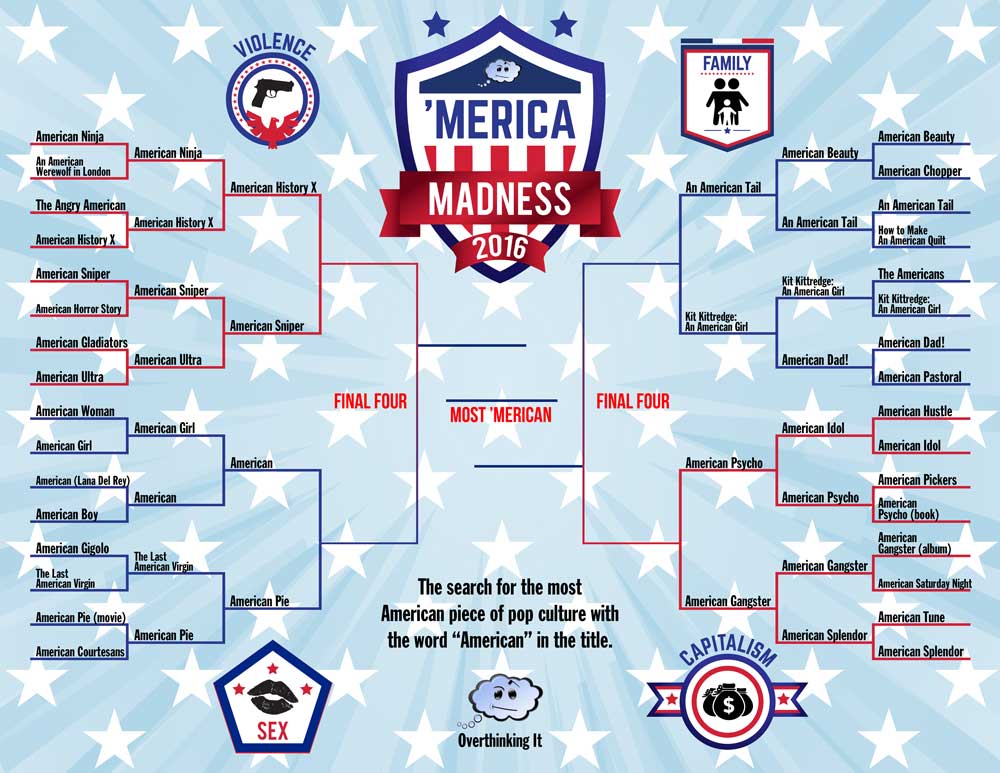
Violence Regional Final: American History X vs American Sniper
I’ve been wringing my hands over this decision for weeks. These two movies represent very different but completely American cultures of violence, and to eliminate either of them feels like denying something fundamental about who we are. Violence born out of crusading American interventionism or violence born out of nativist xenophobia? Violence as part of a military-industrial complex or violence as part of a grassroots uprising? Violence against the world outside our borders, or violence against each other?

American Sniper has some unique points in its favor. First there’s its director, Clint Eastwood, an American icon. His tough guy conservative bona fides are beyond reproach: he’s Dirty Harry, the Man With No Name, and a dozen other rugged killers. And yet as a director, he’s gravitated towards movies that explore the tragic costs of a violent life, from Unforgiven, to Million Dollar Baby, to Flags of Our Fathers. No wonder that American Sniper is a perfect Rorschach test, with thrilling battlefield scenes as well as heartbreaking moments of death and suffering. Ultra conservative Breitbart News called it “A Patriotic, Pro-War On Terror Masterpiece.” CNN called it “a powerful anti-war film.”
Personally, I think although the movie has the greatest respect for the soldiers, it thinks the war itself was a pointless quagmire. At one point Kyle is talking to an Iraqi family who might have information on a top terrorist subject. “You give me a name, and we will take care of it. I can promise you that. We will give you safety.” Instead, the family is killed with a power drill as Kyle watches helplessly from a neighboring rooftop. Everyone who cooperates with the Americans dies in this movie, and Kyle and his unit often leave the battlefield chased by a bunch of angry civilians. In the movie’s final battle, seemingly hundreds of Iraqis swarm Kyle’s group from all sides, as if the entire nation has turned against them.
But here’s another very American thing: Kyle never allows himself to doubt for a moment that what he’s doing is right. At a funeral for one of his fellow snipers, the widow reads a letter he sent home expressing disillusionment with the war. “My question is when does glory fade away,” she reads through sobs, “and become the wrongful crusade?” Afterwards Kyle can barely contain his fury at his dead friend. “We were operating out of emotion, and we just walked right into an ambush,” he tells his wife. “But that’s not what killed him. That letter did. That letter killed Marc.” It’s like faith in the righteousness of America is a kind of protection.
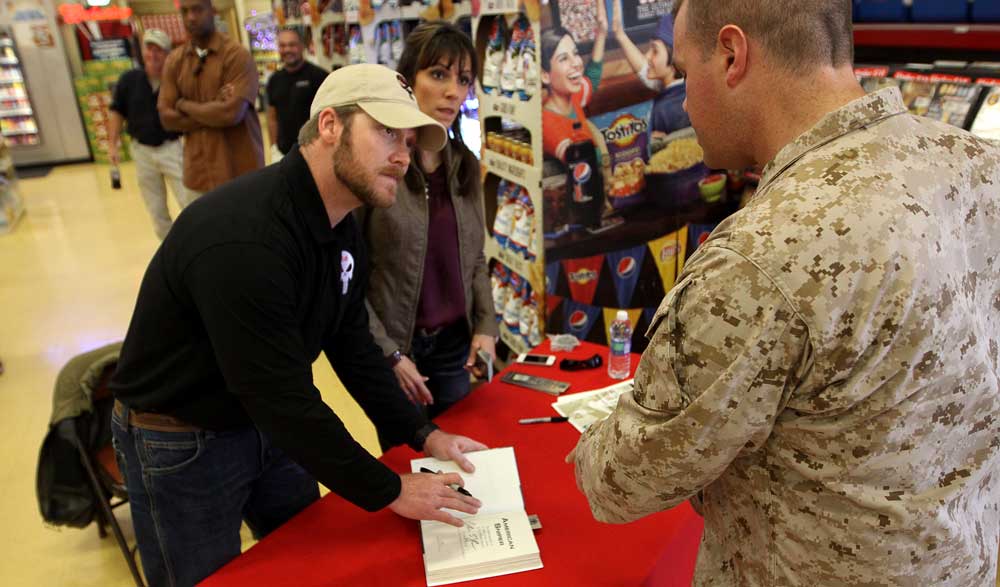
Another very American aspect of American Sniper is the way Chris Kyle helped to build his own legend. The subtitle of his book was “The Autobiography of the Most Lethal Sniper in U.S. Military History,” and he was never shy about tooting his own horn. There were accusations that he overtooted it, inflating his medal count and embellishing some of his stories. In the first printing of the book there was an anecdote about how he gave Jesse “The Body” Ventura a black eye. Ventura sued Kyle for defamation, and the section was removed from later editions. The movie further blurs the line between legend and fact, taking a Syrian sniper only briefly mentioned in the book and making him Kyle’s nemesis. It’s not quite as extreme as what Disney did to Davy Crockett, but whoever the real Chris Kyle was seems obscured by multiple layers of mythmaking. (In the movie, Kyle is never shown writing the book, and he shrugs off his reputation among the troops with “aw shucks” modesty.)
There’s no question that American Sniper is a better film than American History X, which feels over-directed to within an inch of its life. It’s got way too much needless slow motion, way too many stock characters, and Jesus, who the hell thought we needed a children’s choir warbling over the opening credits? In fact, the director of American History X was so unhappy with the final product he tried to get his name taken off it.
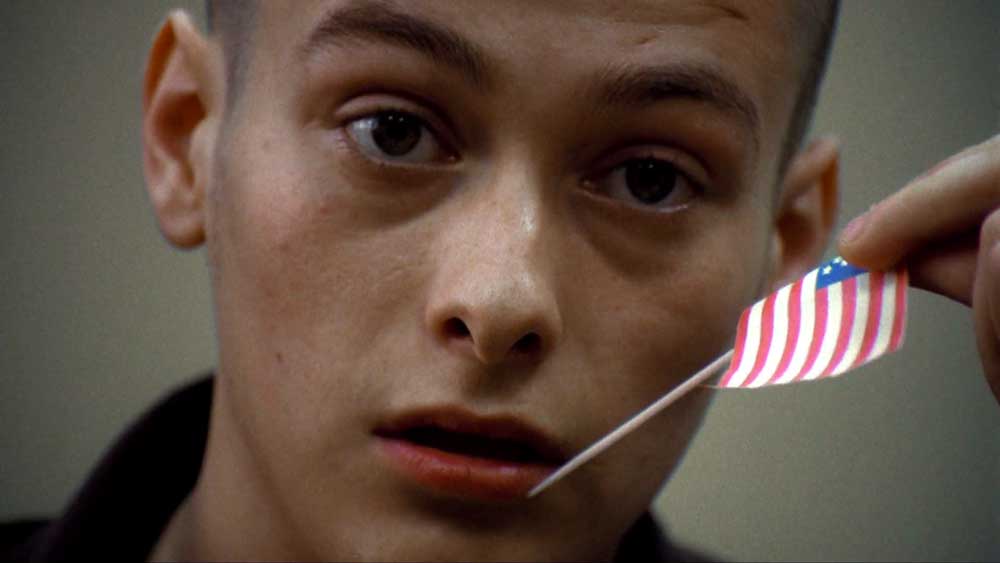
But American History X also feels shockingly, distressingly current. The things Derek Vinyard says wouldn’t be out of place in the comments section of any political article published this year. “Our border policy is a joke,” he seethes. “Every night, thousands of these parasites stream across the border like some fucking piñata exploded.” Gee, if only someone would build a wall or something.
The Vinyard family discusses the Rodney King case, but they could easily be talking about any recent police shooting. “We, as society, grant cops a certain amount of authority to make those calls, because we acknowledge that their job is difficult and dangerous.” Derek has no patience for his liberal sister trying to contextualize black on black violence. “You’re just alleviating the responsibility these people have for their own actions. It’s like saying, it’s not a riot, it’s rage. It’s not crime, it’s poverty. That’s just nonsense.” Just last Monday, Donald Trump said that we have “race riots on our streets on a monthly basis. Somebody said don’t call them race riots, but that’s what they are. They’re race riots.”
This May, a group of Yale students started a petition to make the requirements for an English major include more diverse writers and less of the old school Western Canon. Derek’s father bristles when he hears Derek’s English teacher has assigned them a novel by an African-American. “Now you gotta trade in great books for black books? Does that make sense?”
In February, historian Bruce Bartlett published a paper suggesting that one of the keys to Donald Trump’s success is reverse racism. (A few months later the Supreme Court narrowly upheld the affirmative action policy at the University of Texas, which only added fuel to that fire.) In the movie Derek’s dad fumes that black applicants to the fire department were given preference over the white ones. “America’s about best man for the job. This affirmative-action crap… I don’t know what that’s about.” Later, Derek sneers, “Lincoln freed the slaves 130 years ago. How long does it take to get your act together?”
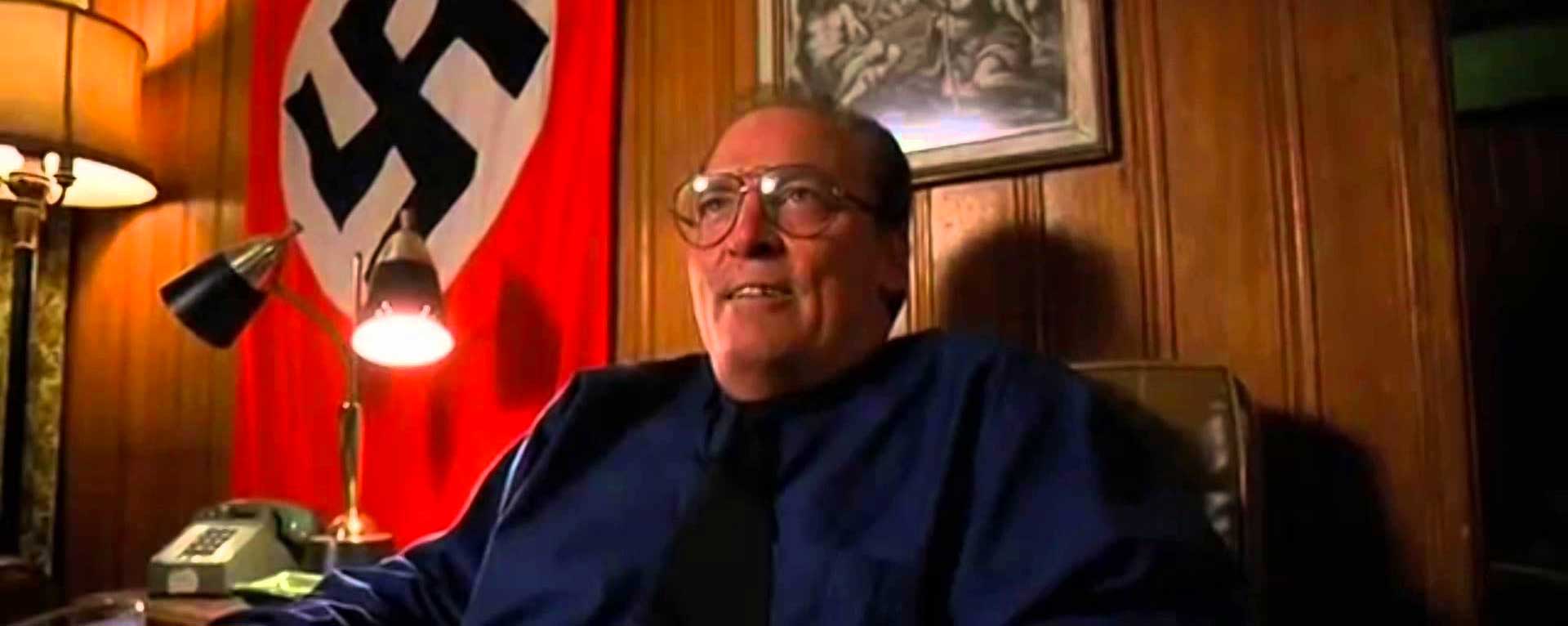
The movie even hints at the sources of that resentment: demographic change and economic downturn. “Venice was a nice, quiet place to grow up,” Danny remembers. “Over the years, though, it’s just gone to hell. The gangs are like a plague. They moved west from Inglewood and South Central and basically took over.” That sense of an eroding way of life builds into rage and violence. “Archie Miller ran that grocery store since we were kids here,” Derek tells his gang. “He went under, and now some fucking Korean owns it… This isn’t our fucking neighborhood. We’re on a battlefield tonight. Make a decision.” You can almost imagine him telling the crowd that they need to vote for him to Make America Great again. Instead, they all pull on ski masks and smash up the place, abusing the latinos working there. In 2015, the chairman of the National Hispanic Leadership Agenda reported there had been a 50% rise in hate crimes against Hispanics over the last five years.
This move is nearly 20 years old and it feels like it could have been written yesterday. Compare that to a 90s movie about gays, like In and Out (1997). Kevin Kline is fired for being a gay drama teacher. Today I think people would be surprised if the drama teacher wasn’t gay.
“Hate is baggage,” Danny says in his posthumous voiceover. “Life’s too short to be pissed off all the time. It’s just not worth it.” But what he misses is that for a lot of Americans, life’s too miserable not to be pissed off all the time, and directing that anger at a group of outsiders is the easiest way to cope with it. Sometimes the targets are African-Americans (To Kill a Mockingbird), sometimes they’re Jews (School Ties), sometimes they’re homosexuals (Philadelphia), sometimes they’re the Irish (Gangs of New York). But America has always been less a melting pot than a fruit salad, and a lot of the time the different fruits kind of hate each other. “He’ll come to me,” the skinhead leader tells Derek about his brother. “I’m more important to him now than you’ll ever be.”
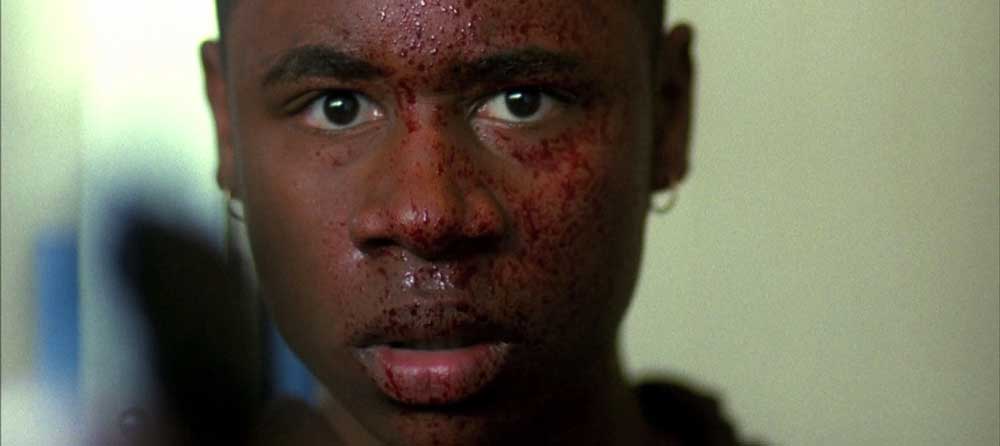
The movie ends by quoting Lincoln: “We are not enemies, but friends. We must not be enemies. Though passion may have strained, it must not break our bonds of affection.” But the truth is that not since Reconstruction have we been quite so bitterly divided. The two candidates for President this year are the most despised on record, and it’s hard to imagine either of them doing anything to unite the country. American History X is the bleak vision for these troubled times.
– Matthew Belinkie
Winner: American History X
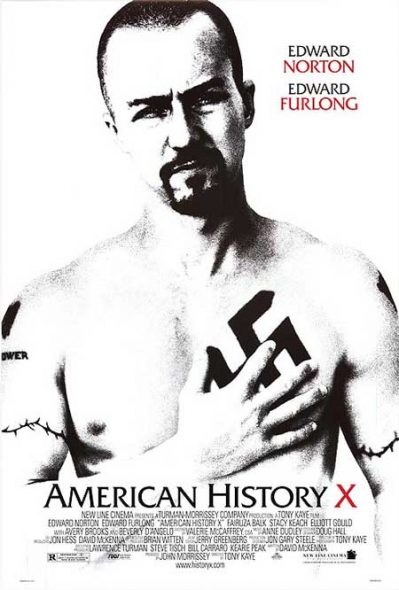
Sex Regional Final: American vs American Pie
Considering that the field contained legitimate works of art like “American Girl” and American Gigolo, it’s surprising that the finalists in Sex are so trivial. “American” is no one’s idea of a classic — I mean, it probably isn’t even a top tier Lana del Rey song. American Pie is pretty iconic, but its genre, the sex comedy, is just about the most disposable kind of movie that Hollywood churns out… and whatever cachet the original American Pie had is rapidly eroding at the hands of its increasingly irrelevant sequels.
And yet, as they enter the hallowed halls of the Overthinking It ‘Merican Showdown Arena, even these shabby competitors can’t help but take on a sort of grandeur. After all, they’re fighting for the right to represent representations of American sex on the world stage! When they step into that ring, all the old champs are in there with them: Eddie Cantor’s “I wanna squeeze an American chickadee, doodle-oodle-doo” (1923), Jackie Collins’s Glamorous American Bitches (1974), Andrew “Dice” Clay’s Grammy-winning comedy album Eeyyy! Americans are Having SEX Over Here! Oh! (1989).
With all this history riding on it, the match between “American” and American Pie becomes something more: this is nothing less than a contest between worldviews. And we might boil it down to this. Which is more American: Sex? Or Romance?
Because that’s essentially what it’s about. The relationship at the heart of “American” is an implicitly sexual relationship, but it’s sex within a broader context of romance. (At least, she’s wild about him… what he thinks of her is a little more vague. But even a one-sided romance is still a romance.) What I mean by that is that it’s an intense emotional encounter between two people. If and when sex happens, it’s only meaningful in the context of that emotional arc: it might be a wonderful celebration of their love, or it might send them into a catastrophic emotional tailspin, but absent some kind of emotional experience, the sex itself doesn’t matter. Also: even though (like all pop songs), “American” is in a sense about all couples, it’s also (like all pop songs) about just one couple. Because emotions aren’t held-in-common. People’s emotional experiences might follow recognizable patterns, but each individual person’s emotion is their own.
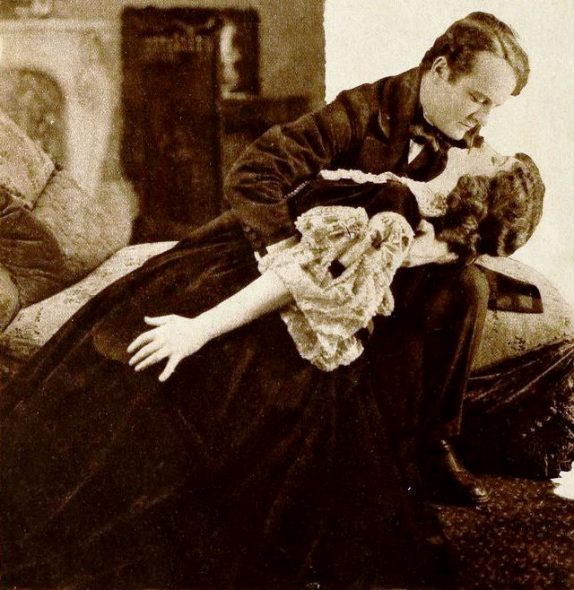
When I dip you dip we dip
This is the way that romance novels have traditionally handled sex, and it’s also the way that sex figures in the majority of pop songs (so it’s fitting that a pop song is bearing that mantle into tonight’s bout). “American” has its own particular take on romance, of course, which we’ve talked about in some of the previous posts. But when it’s squaring off against American Pie, that might not matter so much.
And that’s because American Pie will enters the ring bearing the standard of sex. Like most sex comedies, the film pays lip service to romance by including a couple of characters that treat sex emotionally. Oz and Heather could have been lifted right out of “American,” come to think of it. But romantic sex is just one of the all-American flavors for sale at American Pie’s sexual bar and grille. The film presents a world where sex is everywhere… and everywhere the same. Because even though some of the sex is romantic, and some of the sex is tawdry, when it comes right down to it what matters about the sex is that it’s sex. The physicality of it: even though you don’t get to watch it happen on film, you walk out of the theater knowing that uglies were bumped.

Look, I know this isn’t much of an illustration, but we’re a family-friendly website. Given the topic, my hands are tied.
In addition to being physical, where romance is spiritual, sex is just as unspecific as romance is specific. Now this is probably not actually true. People who have enough sex to know — take the characters from American Courtesans, for instance — could tell us a lot about the specificity of each sexual partner, or even each sexual encounter. But that’s never, EVER been the way that it’s depicted in the media! And American Pie, which builds to a climax of parallel, simultaneous sex scenes between four different couples, underlines this point more firmly than most films of its ilk.
So that’s what’s at stake. But that doesn’t tell us which one wins. And you know what? I’m sick of deciding. Let’s turn it over to Google.
As of this writing, if you google “America sex,” the top result is a recurring feature in Maxim about demographic trends in American hookup culture. The next one down is a site I’ve never heard of — mind you, I live under a rock — called curiosity.com, which posts short informational videos about a variety of topics, including sex. (The videos are reeeeeal basic: “What is sexual reproduction?” “Is sex really exercise?”) And then there’s a piece from Wired titled “Fixing America’s Lousy Sex-Ed — With Sociology.” Notice that all of these reduce sex to aggregate data, a thousand anonymous interactions between two thousand just-as-anonymous rational primates. Two thousand sets of uglies being bumped. (Slightly more than two thousand, I guess: one of the Maxim articles was about which city in America has the most threesomes.)
Now, this is just what we should expect, for sex. But! If we google “America romance,” we find essentially the same trend! A study from the Pew Research Center called “Romance in America.” The official website of an industry group for American romance novelists. An article from Travel and Leisure on “America’s Most Romantic Cities.” To be fair, these aren’t the first three links, but they’re pretty high up. More damningly, only two links on the first page of results are about specific romantic engagements… and both of these are fan theories about Captain America’s love life.

She’s your dead girlfriend’s NIECE for God’s sake! UN-AMERICAN!
So the results for “America romance,” too, are generic and unspecific. Which is unromantic! But also, not all that surprising. The word “American” refers to a teeming mass of humanity. To call a romance “American” is to suggest that it is in some sense generic. Americans are passionate about their romances, but we don’t think of our romances as “American.” We think of them as ours. Sex, on the other hand, can totally be American. And thanks to google, I have the dodgy statistics to prove it. (Plus, this totally lines up with the Tinder-ification of the American dating scene, which means I can plausibly blame the whole thing on the milennials.)
– Jordan Stokes
Winner: American Pie
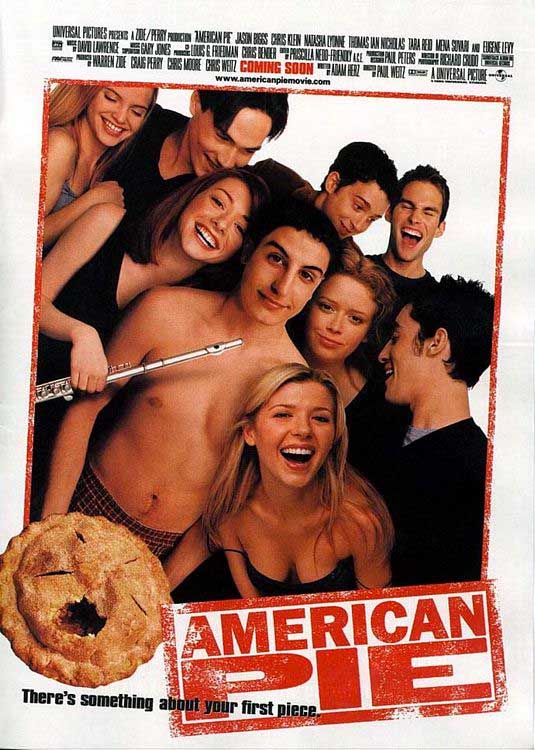
Next time, we finish off Family and Capitalism.
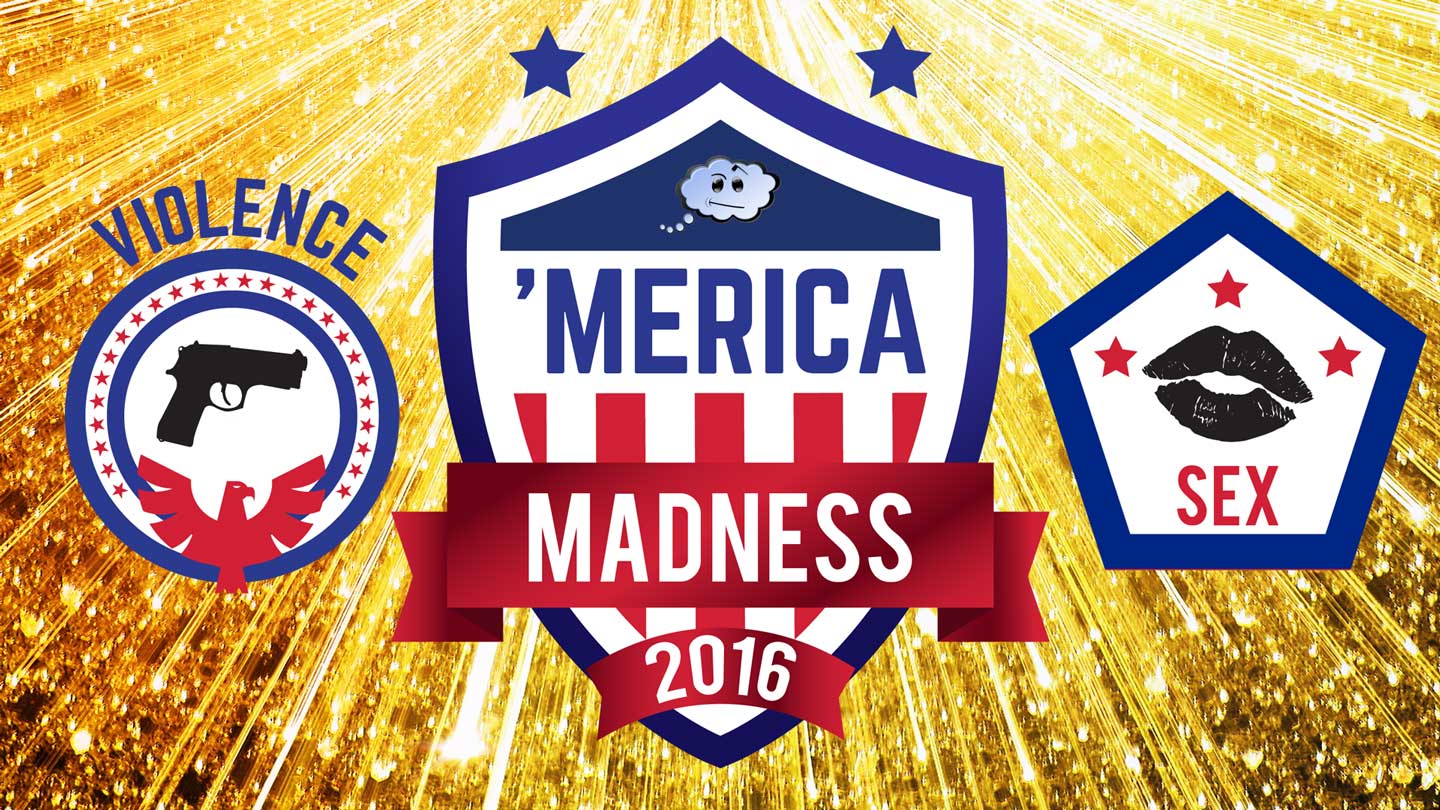
Add a Comment